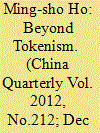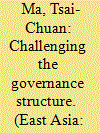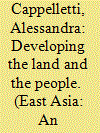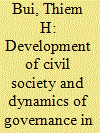| Srl | Item |
| 1 |
ID:
116491


|
|
|
|
|
| Publication |
2012.
|
| Summary/Abstract |
This article challenges the accepted view that during the period of martial law Taiwan's labour unions were "a useless token." Focusing on the petroleum and sugar industries, I analyse the incremental process of how party-state control over the labour unions was converted by the workers themselves in Taiwan's national enterprises. In the early 1950s, the KMT's policy of unionizing enterprises was a complementary strategy to reinforce its slow and unsuccessful party-state penetration. With the unions' prominent role in welfare provision, workers were encouraged to develop a sense of stakeholdership. Over the years, labour unions legitimatized the interests of worker members and thus gave rise to an explosion of claim-making activities - what I call "petty bargaining." By the mid-1980s, labour unions, although still dominated by the KMT, were no longer a Leninist transmission belt, but rather functioned as a de facto complaint centre - an often overlooked precondition for the rise of post-1987 independent labour unionism.
|
|
|
|
|
|
|
|
|
|
|
|
|
|
|
|
| 2 |
ID:
108386


|
|
|
|
|
| Publication |
2011.
|
| Summary/Abstract |
The development of political and economic policies has driven the structure of industry to produce enormous transformations of the political structure in Taiwan. This paper concentrates on foreign policy areas, to demonstrate the long-term dominant influence of structural and institutional constraints upon the state in Taiwan. The analysis concentrates on discussing the interactive structure of the reciprocal penetration between the state and pressure groups, using secondary public and private documents. The investigation shows that the state did not become powerless from the challenges of pressure groups and globalization, but simply generated strategic selectivity and coordination. The investigation of macro from secondary data afford an insight into the different factors involved in shifting the political structure of Taiwan. In addition, we find that the empowering pressure groups also had some resources that the party-state needed. By virtue of spatial interactions, key actors in the governance structure were able to restructuralize the political structure from the earlier Authoritarian regime to the present system of State-corporatism.
|
|
|
|
|
|
|
|
|
|
|
|
|
|
|
|
| 3 |
ID:
139540


|
|
|
|
|
| Summary/Abstract |
Social development in Xinjiang Uyghur Autonomous Region from 1999 to 2009 is the focus of this article. I will explore the current situation among Uyghurs and Hans living in Xinjiang in different social contexts and purviews, mainly assessing problems and open questions hindering a balanced and consensus-based social development in the area. The concept of “development” per se will be understood with a critical perspective. The fieldwork was conducted in 2011 and 2012 in Urumqi, Turpan, Kahsgar, Wujiaqu and Shihezi, and in eight rural villages—seven located in the Kashgar Prefecture and one in Kizilsu Kyrgyz Autonomous Prefecture. The opportunity to adopt an “insider perspective”, at the same time working with critical tools provided by the disciplines of sociology and anthropology, can be considered an important asset in the field of Xinjiang studies. My PhD research in China (2010–2013) and my work as consultant for KFW (2011–2012) have been of great help in adopting this approach. Interviews, participant observation and analysis of quantitative and qualitative data from different sources are the basis of the fieldwork results presented here. UNDP indicators and indexes are taken as reference in setting and organising data.
|
|
|
|
|
|
|
|
|
|
|
|
|
|
|
|
| 4 |
ID:
118020


|
|
|
|
|
| Publication |
2013.
|
| Summary/Abstract |
Civil society has been in operation under one-party rule in Vietnam in the years since the Doi Moi (renewal) in 1986. Despite the continued monopoly of political power by the Communist Party of Vietnam (CPV), civil society has been gradually expanded and developed. The paper reviews recent arguments in the political science and area studies literature on the emergence of civil society in Vietnam's Doi Moi period over the past two decades, to comment on the dynamics of the relationship between civil society and the party-state, problematizing the development of civil society in the context of a one-party-dominated state. At a certain level, civil society has been 'tolerated', 'endorsed', or recognized by the party state to fill a gap in the governance network. In practice, it has never been an easy project for civil society to make its way into Vietnamese society given the party-state's Gramscian concession to maintain the existing hegemony.
|
|
|
|
|
|
|
|
|
|
|
|
|
|
|
|